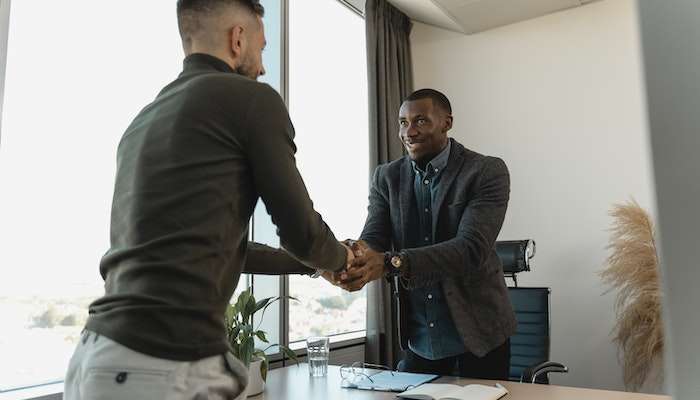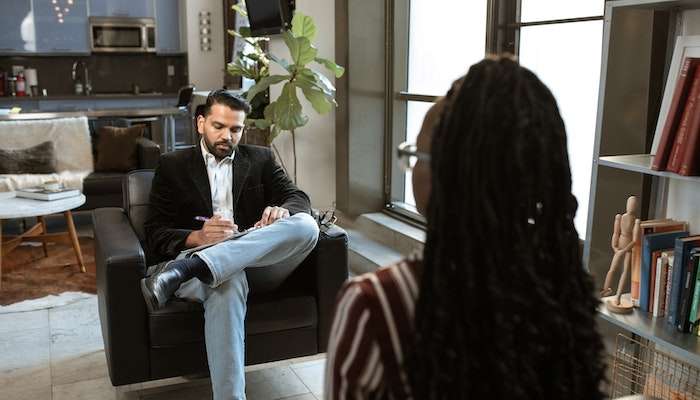
You brushed up your resume and applied for jobs. Now you’ve received an interview invitation for a position you’d like. What can you do to secure the job?
The job interview can be one of the most complex parts of any application process. Many people worry about what to wear and how to act during their interview, and the stress can eat away as you try your best to land the job. So, whether this is your first job interview or the first one in a long time, it may help if you brush up on proper job interview etiquette with these 11 interview tips.
1. Dress to Impress
Many people struggle with selecting interview attire. However, dressing the part can help you create a solid first impression with the hiring manager and may land the job for you. Therefore, you should always prioritize your interview outfit over anything else.

Most of the time, you want to dress similarly or slightly over what you would wear on an average day for the job you are interviewing for. You don’t want to overdress too much and look out of place, but you do want to strike the right tone. So, if the dress code is business casual, wear slacks and a dress shirt with a blazer or jacket. A pair of nice, dark denim pants with polo and belt may work if the environment is more casual.
If you aren’t sure, a nice pair of slacks and a dress shirt or a skirt and blouse will work well. Also, make sure you wear clean, professional-looking shoes as well.
2. Research, Research, Research
Many people don’t take the time to research the company and position before the interview. However, taking the time to do this shows the company you are genuinely interested in the work.
At a minimum, see who you’d be working with or may report to, and get a general idea of what the company does. If you can, bring something you found during your research up during the interview so you can show the person conducting the interview that you did your homework.
3. Rehearse the Interview
Interviews cause anxiety. You cannot avoid that, but you can lower your anxiety and stress levels by practicing for your interview ahead of time.
To rehearse for the interview, ask a friend or family member to sit and ask you interview-style questions. Answer them just like you would during the interview so you get direct practice. If you aren’t sure what questions they may ask, do a quick internet search for common interview questions and choose several that seem relevant.
4. Show Up Slightly Early
You never want to be late for an interview. However, you also don’t want to rush in the door mere minutes before your scheduled interview time either. Instead, you want to show up early enough so that you have a few minutes to breathe and calm down before they call you into the interview.
If possible, show up 10 or 15 minutes before your scheduled interview time. If you are earlier than that, you may want to take a stroll around the neighborhood and prepare yourself.
5. Focus on the Interview
When you enter your interview, you want to appear focused and invested in your discussions with your potential employer. So, be sure to remove distractions before you even start. Turn off your phone, and remove anything distracting like a bracelet or other item you may fidget with during the interview.

6. Give a Strong First Impression
Interviews give employers a minimal window into who you are. Unfortunately, this means that the people deciding whether or not to hire you have to decide based solely on your resume and what you give them during the interview. Therefore, you need to establish a strong first impression.
When you introduce yourself, offer a firm handshake and speak clearly. Make eye contact throughout the interview, and talk confidently if you can. All of this will help you make a solid first impression.
7. Pay Attention to Body Language
Whether you realize it or not, your stance and posture communicate just as much as your words. This is called body language, an art form many of us have lost touch with.
During the interview, pay attention to where you place your arms and legs. Crossing them can make you seem defensive or closed off. Similarly, looking down or keeping your hands in your lap can make it look like you lack confidence.

If you usually talk with hand gestures, pay attention to those as well. You don’t want to come across as aggressive or intense. You may even want to practice these hand gestures in advance if possible. This can help you feel better.
8. Answer Honestly
Everyone wants to provide the best possible answer to each interview question. However, employers can tell when applicants lie or make up answers on the spot. This doesn’t make you look good in the eyes of the employer and is generally frowned upon.
Instead, answer each question honestly. If you need a moment to think, say so. If you feel unsure of an answer, find a way to communicate that tactfully in your response. Providing genuine solutions will show the employer that you value transparency and honesty over “looking good.”
9. Bring Questions to Ask
As you stress over making a great first impression, you may forget that interviews are a two-way street. The process is meant to help an employer determine if you will be a good fit for the position and also to help you decide if the job and company are a good match for you.

You can ask what day-to-day life looks like in the position, what advancement opportunities would be available, and the company’s long-term goals. You can also ask what skills the employer is looking for or what type of person they hope to hire. There’s no such thing as a stupid question, so ask away!
10. End With Something Positive
Eventually, the interview will end. However, you don’t want to say “thank you” and walk out. You want to leave the interview team with one final positive note about you. As you thank them, you can share why you would be a good fit, bring back up a point the interviewer made and your experience, or anything else that seems relevant.
Keep it short and sweet, but sell yourself as much as possible with that final positive thought.
11. Send a Follow-Up Email
You will rarely receive a job offer within the interview. In most cases, employers spread interviews over several days and may even conduct reference checks or the second round of interviews before they make a decision. However, you can ensure you don’t get left in the dust by sending a well-written follow-up email after you leave. Most people send these within 48 hours of their scheduled interview time, and there are countless online templates to help you out.
Frequently Asked Questions
Does landing a job interview mean I will get the job?
No. Job interviews are one of the steps in the hiring process, but securing an interview doesn’t necessarily mean you got the job. In fact, only one-third of the people who go through the interview process receive a job offer.
What are the most common mistakes people make during a job interview?
Most of the time, people bomb job interviews either because they go into the interview unprepared or because they go into the interview with a poor attitude. Both issues become apparent as an applicant answers questions and interacts with the hiring team.
Image credit: Pexels











